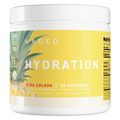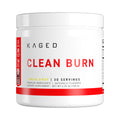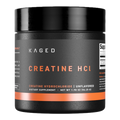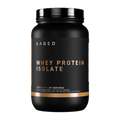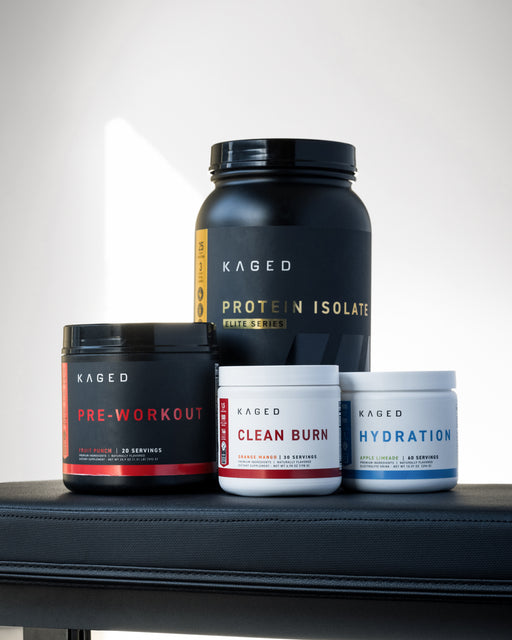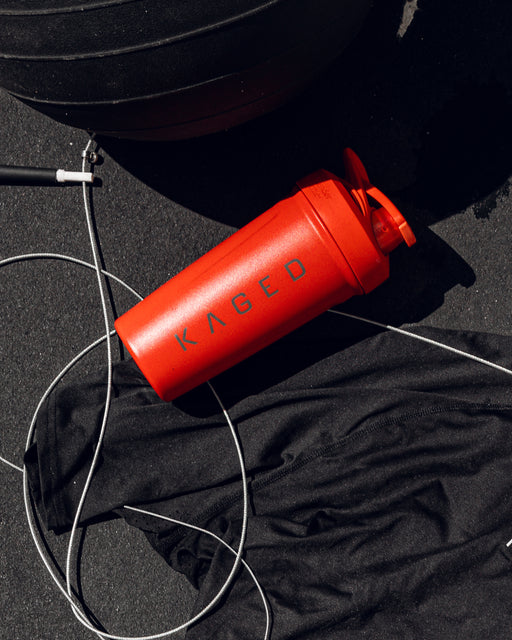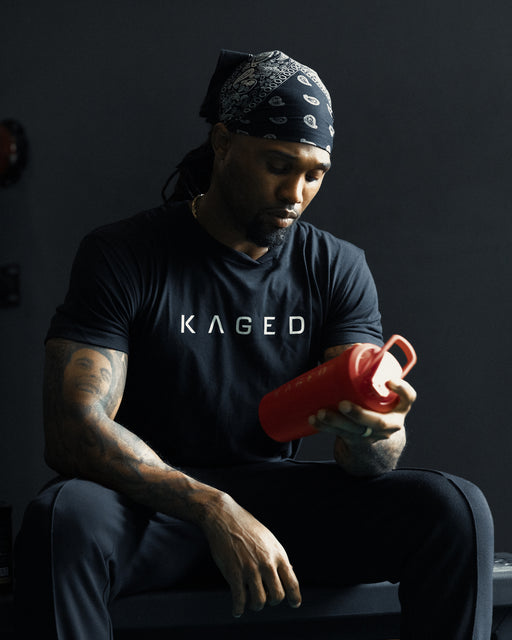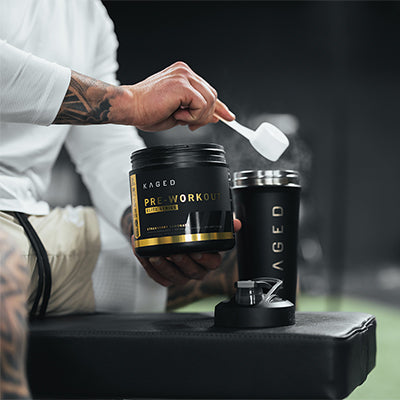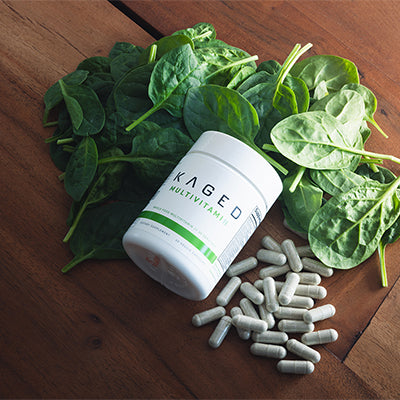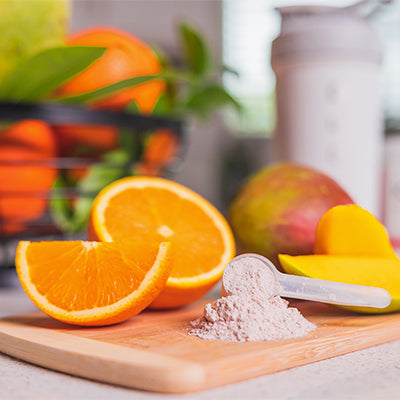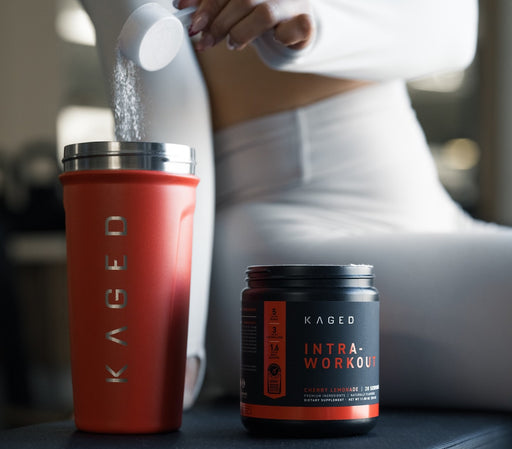Creatine is one of the most popular, well-researched supplements in existence. Its benefits speak for themselves, with decades of research supporting its role in strength, muscle growth, recovery, and performance.
Here are just a few benefits creatine has been shown to provide (Buford et al., 2007):
- Increased strength and power*
- Increased muscle mass*
- Improved between-set recovery*
- Improved sports performance*
With its rise in popularity, many different forms of creatine have been made. Each of these has slight differences.
Here, we will break down the differences and benefits of an emerging form called creatine HCl.
We’ll focus on its benefits, the proper dose, when to take it, and more.
Behind the original creatine monohydrate, creatine hydrochloride (HCl) is the second most popular form.

What’s the Recommended Creatine HCl Dosage?
Before we get into the benefits, let's talk about the dose at which you get those benefits.
The optimal creatine HCl dosage is 3–5 grams per day.
That’s the same amount recommended for creatine monohydrate. While creatine HCl is sometimes marketed as having higher absorption, the research shows that you need the same dose to get the same results.
The Benefits of Creatine HCl
The human body makes around 1g of creatine per day, which is synthesized mainly within the liver and kidneys (Persky et al. 2001). The majority of creatine stores are found within muscle.
However, this 1g the body makes well below the 3g-5g dose that has been shown over in over in research to lead to benefits. That's why athletes turn to supplementation and getting creatine from their diet, in foods like meat and fish (Burke et al. 2008).
Within the vast landscape of creatine supplements, here are the unique benefits of creatine HCl.
Now that we’ve covered dosage, let’s dive into what makes creatine HCl unique compared to other forms.
-
Higher Solubility = Easier Mixing. It dissolves better than other creatine forms.
-
High Absorption & Cell Permeability. Highly bioavailable.
-
Less Bloating & Water Retention. Mixes with less water, reducing the “puffy look.”
-
Gentler on the Stomach. Easier mixing = fewer digestive issues.
1. Higher Solubility = Easier Mixing
Solubility or in this case, ‘aqueous solubility’ (solubility in water), describes how well creatine mixes and is absorbed.
Below is a list of the common creatine forms and their relative solubility score (the higher the score, the greater the solubility).
As you will see, creatine HCl has by far the best solubility.
Creatine Monohydrate: 1.0
Creatine Citrate: 3.0
Creatine HCI: 37.9
High Solubility means your creatine HCl will mix easily. As you may know from other forms, most creatine mixes terribly and leaves a chalky, unpleasant texture. It often clumps at the bottom of your shaker.
Thanks to its high solubility, it's also much more pleasant and easy-mixing on its own as a flavored drink. It's why we made our Creatine HCl with both lemon lime and fruit punch options.
2. High Cell Permeability
In this context, cell permeability describes how well creatine crosses the intestinal barrier. Creatine HCl also has high cell permeability. In simple terms, Creatine HCl is a high-absorption form of creatine.*
3. Water Retention
Creatine and water have a well-known relationship.
Many sources of creatine require a large amount of water to mix into a beverage form that it can mix. This is often why some people experience digestive issues and extracellular (outside the cell) water retention with creatine.
While creatine supplementation comes with a necessity to focus on hydration, many athletes appreciate being able enjoy a serving of Creatine HCl in less ounces of water than would be required to make monohydrate easily mixable.
This also makes creatine HCl the better choice if you’re looking to avoid the puffy, water-retained look.
For this added benefit, many bodybuilders and physique competitors turn to creatine HCl.

4. GI Distress
For those struggling with GI discomfort/distress on their regular creatine supplement, switching to a form of creatine, such as Creatine HCI which you can easily mix with less water, could help.
While some people may be just fine on other forms of creatine, many athletes prefer HCl for its easy mixability in less water.
Overall, creatine HCl’s benefits come from the fact that it dissolves fully with less water, compared to traditional forms of creatine.
Not All Creatine HCl is Created Equal: How to Know You’re Getting Pure, Quality HCl
If you buy creatine HCl, and it’s truly pure creatine HCl, the label will say “Patented C-HCl® and include information about the Vireo family of patents.
Only a select few brands were granted rights to use Patented C-HCl® in their pre- and post-workout formulas.
If you don’t see “Patented C-HCl®” and information about the patent numbers, then you have generic HCl that’s, simply, not pure, original creatine HCl.
Learn more about what makes our Kaged Creatine HCl, featuring Patented C-HCl®, is different.

How to Take Creatine HCl
Now that we've covered the benefits of creatine HCl, let's cover the common questions associated with how to take it. In sum, you take creatine HCl the same as you would take any other form of creatine.
What Is The Optimal Dose of HCl?
Regardless of the source, the muscle-building and performance benefits of creatine peak around 3-5 grams per day.
That means you should aim to take 3-5g of creatine HCl per day.
The optimal dosage will vary based on your bodyweight. We recommended starting with 3 grams per day.
Remember to check your pre and post-workout supplement ingredient list. Just because it lists creatine, some products contain smaller amounts of creatine, meaning you will need to add additional creatine if you want to reap all the benefits.
For additional, unflavored creatine HCl that mixes easily with any supplement stack, you can check out Kaged Patented Creatine HCl® .
As we mentioned, this form of creatine mixes easily, so it will dissolve in any stack and leave a smooth texture.
Do You Need to Load Creatine HCl?
Creatine loading is a debated topic within the bodybuilding community. The answer to whether or not you should load creatine may depend on the source and an individual’s goal.
Most sources of creatine do not need to be loaded and it provides no additional benefit (Willoughby et al., 2006), although loading may help you saturate the cells a few weeks faster.
The same goes for creatine HCl. Loading creatine HCl is not necessary. It really comes down to the individual. If you want to load creatine at the start, you can.
The research shows that without loading creatine takes at least 28 days to accumulate in the body before providing benefits.
In simple terms, creatine loading is the fast track, but it’s not necessary.
When Is The Best Time to Take Creatine HCl?
Creatine may be best suited around the workout; however, research has yet to reach a definitive answer. The research on creatine timing is mixed.
Some studies have found additional benefits post-workout, which may be due to increased blood and nutrient flow to the muscle, caused by a variety of mechanisms such as GLUT 4 translocation (Steenage et al., 2000).
However, other studies have found no additional benefit when taking creatine further from the post-workout window.
Although this is when creatine was studied in isolation, other research has shown the insulin spike from protein and/or carbohydrates (like in your post workout shake) may aid in absorption (Steenage et al., 2000).
If you consume a post-workout shake, it would make sense to throw your creatine in with it, much like Kaged does with our Post-Workout Protein.

What’s important about creatine isn’t when you take it, it’s that you take it.
We suggest taking it whenever it works best for you. That could be your morning smoothie, your pre-workout stack, or post-workout shake.
Do I Need to Cycle Creatine HCl?
Another popular strategy to cycle your creatine intake; however, no research has shown this to be superior to a consistent, daily dose (Willoughby et al., 2001).
Without evidence of health risk or performance improvements from cycling, you may just be wasting periods of time when your creatine stores become depleted.
Countless users have taken creatine daily for years without cycling it and have seen no adverse effects. In fact, they simply continue to gain from the benefits of creatine.
This goes for creatine HCl, as well as other forms of creatine.
Should I Mix Creatine HCl With Other Supplements?
Some supplements may aid in creatine absorption, including protein and carbohydrates (Steenage et al., 2000). This strengthens the case to include creatine in your post-workout stack.
On the other hand, other supplements such as Beta-alanine have recently been found to work synergistically and further increase its performance benefits (Hoffman et al., 2006). Beta-alanine is one of the most popular ingredients in pre-workout supplements. So this strengthens the case to put creatine in your pre-workout stack.
On the whole, you definitely can stack creatine with just about any other supplement in your arsenal, but it’s not totally necessary. Our creatine HCl also comes in a lemon lime and fruit punch flavors that are delicious on their own.
Should Beginners Use Creatine HCl?
Creatine is effective for everyone from beginners to advanced athletes. As a beginner, there are a few considerations to keep in mind, like the importance of hydration.
For all of this and more, check out our article on creatine for beginners. In general, creatine HCl is a solid choice for beginners since it mixes so well and comes in delicious flavors.
Should I Use Creatine Powder or Pills?
Our patented Creatine HCl comes in both powder and pill choices. To decide what's best for you, check out our article on creatine powder vs pills.
If You Want to Try Creatine HCl...
Creatine HCl can be a great addition to your stack to get all the well-documented power, muscle, strength, and between-set recovery gains of creatine, in a highly soluble form.
At Kaged, our patented C-HCl product is one of the highest-quality, purest products on the market.

References
Bakian, A.V., Huber, R.S., Scholl, L. et al. Dietary creatine intake and depression risk among U.S. adults. Transl Psychiatry 10, 52 (2020). https://doi.org/10.1038/s41398-020-0741-x
Vandenberghe, K., Gillis, N., Van Leemputte, M., Van Hecke, P., Vanstapel, F., & Hespel, P. (1996). Caffeine counteracts the ergogenic action of muscle creatine loading. Journal of applied physiology, 80(2), 452-457.
Persky A, Brazeau G: Clinical pharmacology of the dietary supplement creatine monohydrate. Pharmacol Rev 2001, 53:161-176.
Burke DG, Candow DG, Chilibeck PD, MacNeil LG, Roy BD, Tarnopolsky MA, Ziegenfuss T: Effect of creatine supplementation and resistance-exercise training on muscle insulin-like growth factor in young adults. Int J Sport Nutr Exerc Metab 2008, 18:389-398.
Gualano B, Artioli GG, Poortmans JR, Lancha Junior AH: Exploring the therapeutic role of creatine supplementation. Amino Acids 2010, 38:31-44.
Tarnopolsky MA: Creatine as a therapeutic strategy for myopathies. Amino Acids 2011, 40:1397-1407.
Buford T, Kreider R, Stout J, Greenwood M, Campbell B, Spano M, Ziegenfuss T, Lopez H, Landis J, Antonio J: International Society of Sports Nutrition position stand: creatine supplementation and exercise. J Int Soc Sports Nutr 2007, 4:6.
Hoffman, J., Ratamess, N., Kang, J., Mangine, G., Faigenbaum, A., & Stout, J. (2006). Effect of creatine and ß-alanine supplementation on performance and endocrine responses in strength/power athletes. International journal of sport nutrition and exercise metabolism, 16, 430-446.
Kaemmerer, W F et al. “Creatine-supplemented diet extends Purkinje cell survival in spinocerebellar ataxia type 1 transgenic mice but does not prevent the ataxic phenotype.” Neuroscience vol. 103,3 (2001): 713-24. doi:10.1016/s0306-4522(01)00017-3
Miller, D. Oral bioavailability of creatine supplements: Is there room for improvement? Annual Meeting of the International Society of Sports Nutrition, 2009.
Steenge GR, Simpson EJ, Greenhaff PL: Protein- and carbohydrate-induced augmentation of whole body creatine retention in humans. J Appl Physiol 2000, 89:1165-71
Willoughby DS, Rosene J: Effects of oral creatine and resistance training on myosin heavy chain expression. Med Sci Sports Exerc2001, 33:1674-81
*These statements have not been evaluated by the Food and Drug Administration. This product is not intended to diagnose, treat, cure or prevent any disease.
